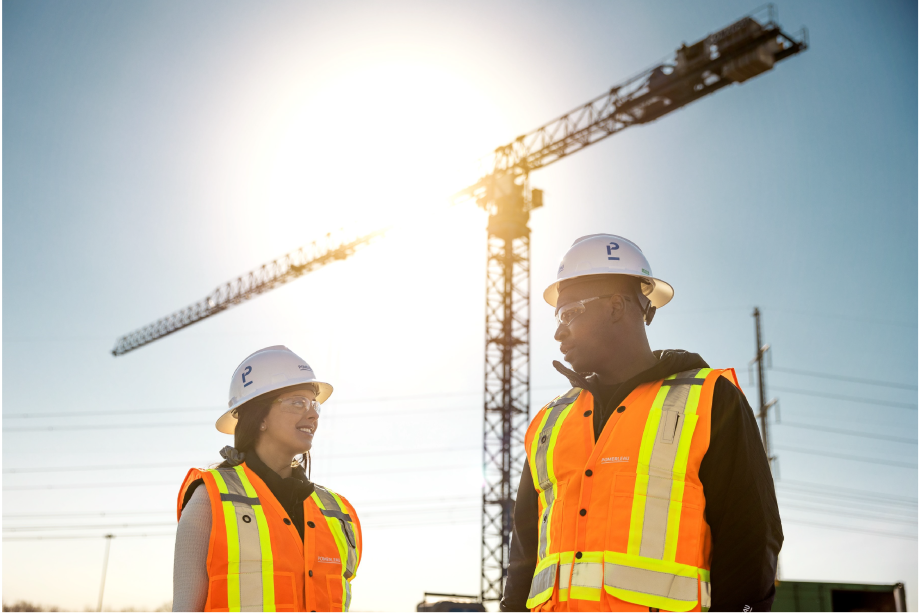Chances are Pomerleau will demolish any preconceived notions you have about construction companies.
The sixty-year-old firm includes “love” among its corporate values.
It is a powerful expression but, as Genevieve Roy, Vice President of Environment and Sustainable Development explains, it is also a value embedded into every facet of the firm. “It speaks to the love of what we do and how we do it. It is also about our love for the people in the communities where we build, and the love we put into protecting our planet.”
Arguably, a privately-run company, may not feel obliged to ‘show some love’ when it comes to the environment. As Genevieve, who joined the environment and sustainability department in 2019, points out: “No one is forcing us to publish what we are doing to protect our planet.”

But she notes Pomerleau is part of an industry that generates more than one-quarter of the solid waste that ends up in Canadian landfills. That’s the kind of data point that compels the construction firm to build differently.
Photo: Genevieve says love is a value embedded into every facet of Pomerleau.
Instead of “using fuel to transport waste concrete from a demolition job to a land fill”, the firm will repurpose materials for other projects. For instance, during an excavation, Pomerleau crews found a material that was reused as “finishing sand” for a beach at Quebec City’s Promenade Samuel-de-Champlain, which was completed this July.
In 2022, the firm was able to divert on average 72 per cent of construction waste on its sites from landfills, an increase of four percent compared to the previous year.
The construction industry’s adoption of LEED has increased in recent years, in large part through projects promoted by governments and institutional investors like RBC according to Genevieve. That bodes well for a country transitioning to a net-zero economy, as the LEED certification process is an effective and readily available way for owners and developers to reduce carbon emissions through various practices and procedures.

“We may construct a super energy efficient building but, in Canada, it is still done in a very traditional way, using diesel powered equipment and higher carbon material. We recognize the need to build differently,” explains Genevieve.
Pomerleau’s portfolio of buildings seeking green certifications has expanded rapidly, from 36 percent in 2020 to 65 percent in 2022, with the majority being LEED designated. This includes several RBC-backed LEED v4 projects, which require builders to use low carbon building materials. Current jobs include the construction of a hospital, seniors’ residences, and high schools.
“We can only promote such changes if we are joining forces with like-minded companies in setting ambitious targets,” says Genevieve. “RBC represents a solid ally to propel investment in the low-carbon economy by financing low-carbon projects, investing in decarbonization projects and by influencing other stakeholders to embark on the net-zero journey.”
Clients are responding well to the firm’s focus on building differently. In 2022, the company won 13 new mandates focused on reducing carbon footprints, more than double it earned in the previous year.
More broadly, Genevieve credits investors like RBC for encouraging Pomerleau to disclose its GHG emissions which, in turn, has prompted the construction firm to further reduce and offset them.

The company plans to abate the greenhouse gas emissions it directly generates from its operations and those indirectly incurred through its energy purchases by 40 percent by 2030, using 2021 as its base year.
Genevieve admits there was a lot of uncertainty when the company first adopted its emissions target. “But as we began to implement our plan, like investing in more energy efficient equipment, we saw some immediate benefits. It’s inspired a more innovative culture. Our employees are increasingly proud to work for a company that shares similar values as them. And we have even derived some cost savings.”
The construction firm is also looking for ways to support natural habitats that absorb more carbon emissions from the atmosphere than they release. Alexandre Gowett, Vice President, Treasury said RBC has provided Pomerleau executives with “invaluable” advice and access to fully understand how this initiative could be financed through a loan that ties the terms of the agreement to Pomerleau’s achievement of a pre-determined sustainability target. The savings from the cost of borrowing could then be used to finance their natural habitat initiative.
“Having this kind of support is very important for small and medium-sized businesses that want to make a positive environmental impact, but don’t know where to begin. RBC has its own strategy in place, and developed an expertise in this space, which can help more businesses move forward,” says Genevieve.
It will take a lot more than love to help Canada transition to a net-zero economy. Genevieve points out that industry players like Pomerleau will need to “foster open and active collaboration between all industry partners – including the competition — to achieve the common goals such as decarbonization, and the promotion of circular economy.” But it’s hard to imagine how these efforts could come together without the kind of love Pomerleau seeks to build into its business.

Photo: Clients are responding well to the firm’s focus on building differently. In 2022, the company won 13 new mandates focused on reducing carbon footprints, more than double it earned in the previous year.
This article offers general information only and is not intended as legal, financial or other professional advice. A professional advisor should be consulted regarding your specific situation. While information presented is believed to be factual and current, its accuracy is not guaranteed and it should not be regarded as a complete analysis of the subject matter discussed. All expressions of opinion reflect the judgment of the author(s) as of the date of publication and are subject to change. No endorsement of any third parties or their advice, opinions, information, products or services is expressly given or implied by Royal Bank of Canada or its affiliates.








